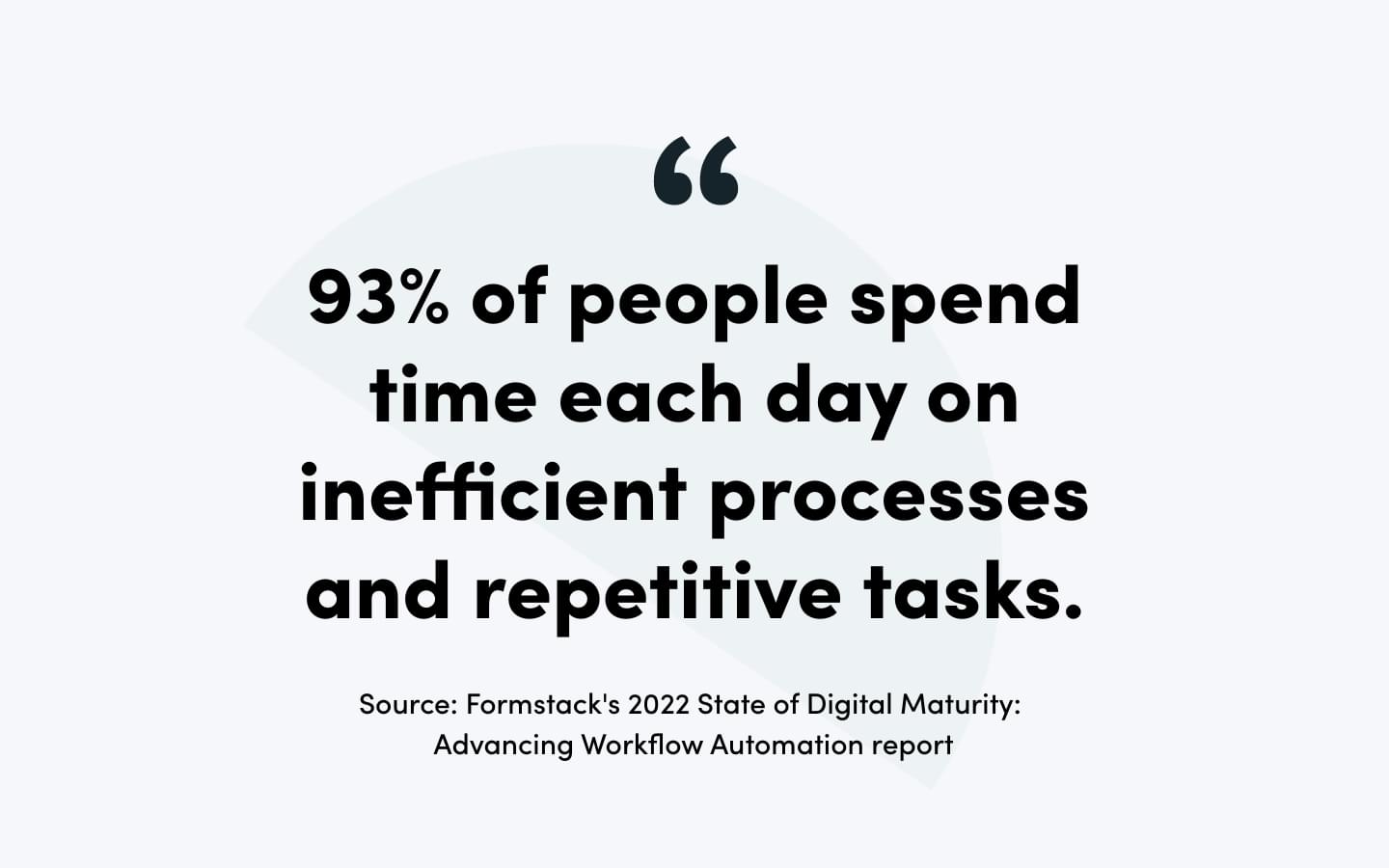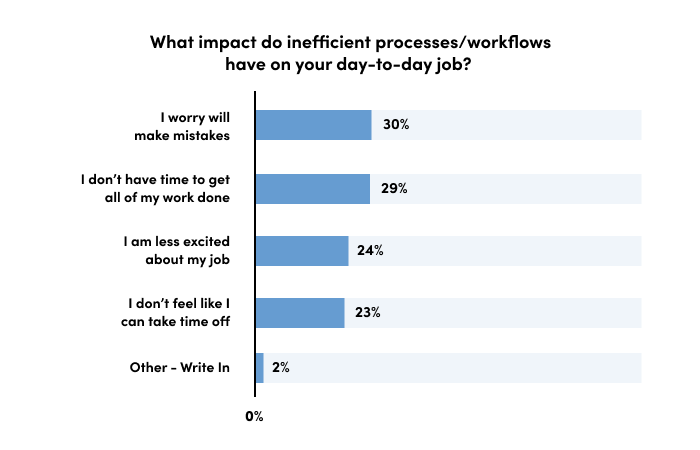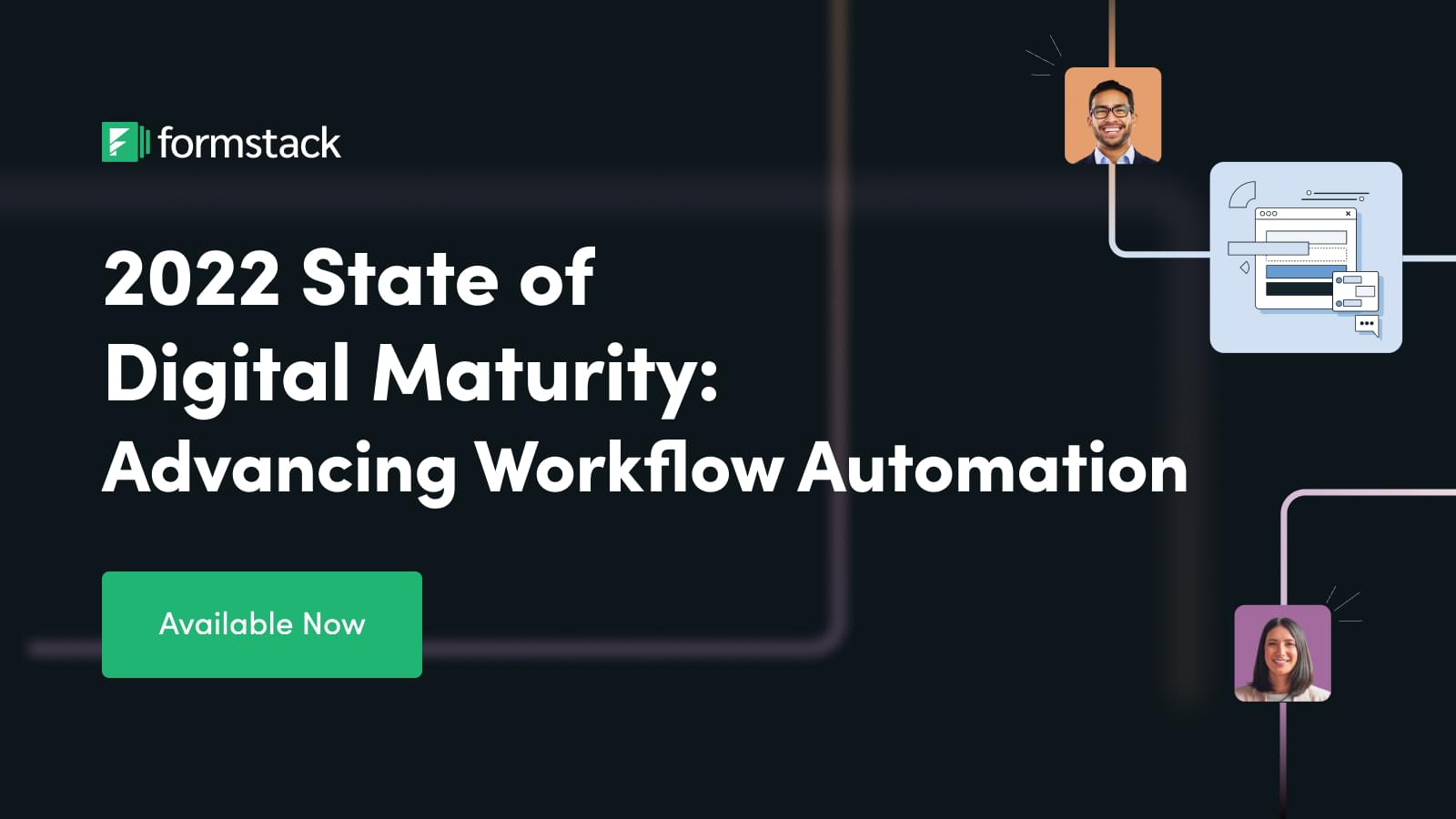Have you ever wished for more time in your workday?
Do you often feel frustrated that you’re behind on your to-do list?
Are tedious, repetitive tasks keeping you from completing high-impact work?
You’re not alone.
In our recent State of Digital Maturity research, we found that 93% of people spend time each day on inefficient processes and repetitive tasks.

In fact, 51% of workers report wasting at least two hours per day on administrative tasks, such as data collection and data entry. This manual work impacts not only 10 hours of work per week, but also the health and happiness of employees. We found that 72% of people think their job is negatively impacted by busywork.

What can make the madness stop and help you regain your precious time? Advancing the digital maturity of your organization.
What is digital maturity?
Digital maturity is more than a buzzword or trending topic. It helps organizations measure their ability to use technology to reach maximum efficiency. For our 2022 State of Digital Maturity report, we chose to paint the picture of digital maturity versus crafting one finite definition.
How Formstack thinks about digital maturity.
Imagine a company that is highly efficient—one that has streamlined all internal and external processes. Employees are no longer bogged down with manual, repetitive tasks. They’re able to spend more time working on projects that deliver significant impact and improve the customer experience. Thanks to this level of efficiency, the company can quickly scale or adapt to address changing customer needs and market shifts.
The statement above describes an organization that has reached optimal digital maturity. In short, digital maturity is a measure of an organization’s ability to use digital solutions to quickly adapt to the needs of today's technology-driven world.
Learn More: How Workflow Automation Impacts Digital Maturity
Definitions of digital maturity.
Digital maturity is still a somewhat new term with various interpretations and definitions. Because it has no standard definition, we thought it might be helpful to share a few definitions from across the web as well:
Boston Consulting Group defines it as a measure of an organization’s ability to create value through digital. They state it is a key predictor of success for companies launching a digital transformation.
Dave Rutkowski, CEO of Performance Improvement Partners, explains it well in this comprehensive article on digital maturity. He describes it as “the ability to quickly respond to or take advantage of opportunities in the market based on current tech stacks, staffing resources, and digital technology. It’s an organization’s ability to take on digital transformation not only from the standpoint of digital technology, but organization-wide, including people, culture, and processes, to achieve business outcomes.”
Techslang provides a short definition of “an organization’s ability to respond and adapt to disruptive technological trends.” It goes on to say that digital maturity “is not directly proportional to the amount you invested in your business’s digital technology. A company, for example, can invest thousands of dollars in cutting-edge technology but if its employees refuse to use these because the tech is too complicated or does not add value, they are not really digitally mature.”
Why is digital maturity important?
For our State of Digital Maturity report, we surveyed 2,000 knowledge workers in the U.S. to determine where organizations are in their digital maturity journey. We then analyzed the data to discover how digital maturity impacts overall business.
We found that the more digitally mature an organization, the more likely it is to see success across various areas of business. Here’s a look into how the most optimized organizations differ from their less digitally mature counterparts, pulled from our 2022 State of Digital Maturity report.

It’s less challenging to retain employees.
We found that the less digitally mature an organization, the more likely it is to have a hard time retaining employees. Part of this may be related to the impact of antiquated systems, like paperwork, on the employee experience.
Digitally mature organizations understand the connection between the employee experience and access to technology. These organizations provide employees with the tools and resources they need, like no-code, to ensure they can do their jobs efficiently and effectively. For instance, our research found that 86% of employees prefer digital forms over paper, yet less digitally mature organizations still rely on paper for a majority of their workflows.
This reliance on paper causes a lot of frustration for employees. In fact, when asked about their least favorite work task, over 300 respondents from less digitally mature organizations noted paper or paperwork.

Did you know? Only 15% of orgs are fully digitized, which means 85% are still being held back by Big Paper.
Technical delays rarely impact projects.
We found that those who work for more digitally mature organizations are less likely to have their projects delayed. 61% of digitally mature organizations say they rarely or never have projects or initiatives delayed due to a lack of technical resources. These organizations not only have the staff necessary to advance technical projects, but they invest in software that allows teams outside of IT and development to create the systems, workflows, and processes they need.
More than 50% of less digitally mature organizations report running into technical delays sometimes or often. As a result, many find it difficult to keep up with the competition and customer expectations. These technical delays can also have a negative impact on employee morale and engagement. We found that employees at more digitally mature organizations are generally happier, less stressed, and more productive because of the efficient systems and processes they have in place.

It’s easier to make changes.
Only one in four organizations feel prepared to quickly adapt and scale operations. For less digitally mature organizations, this struggle stems from a resistance to change. For instance, when asked why they rely heavily on paper, 34% said it’s because that is how it has always been done.
Our research found that the more digitally mature an organization, the more they embrace change and can easily adapt to market changes and customer needs. Here are some of the ways this mindset helps digitally mature organizations:
- They are able to get new technology approved quickly.
- They are open to testing out new ideas and strategies.
- Their employees feel more autonomous.
- Their tech stacks shift as needs change.
- They continually improve and modernize systems.
We found that digitally mature organizations have broken free of the “it’s always been done this way” mindset, which allows them to focus on important organizational improvements. There seems to be a level of comfort in the status quo at less digitally mature organizations that holds them back from progressing their digital transformation goals.
Advance your organization's digital maturity.
These are only a fraction of the insights we uncovered in our 2022 State of Digital Maturity report. If you’re interested in learning more about how the most digitally mature organizations work efficiently, read the report now.












